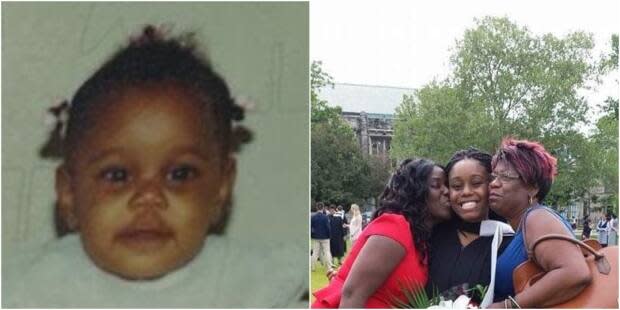Government tells Ajax woman she may not be Canadian

Last September, 32-year-old Arielle Townsend came home to a letter from the federal immigration department stating her Canadian citizenship was at risk of being revoked.
Townsend, who lives in Ajax, Ont., was "completely blindsided."
She'd come to Canada as an infant in 1992. She was not yet a year old when a Mississauga, Ont., citizenship office issued her a citizen card.
"I was shocked and completely in disbelief," she said. "It's almost like you go to bed as one person, and then you wake up and you're like, 'I'm a completely different person.'"
Townsend has since hired lawyers and responded to the letter from Immigration, Refugees and Citizenship Canada (IRCC), which told her: "There is information on your file indicating that you may not be entitled to certificate of Canadian citizenship issued to you."
Townsend and her lawyers have provided the government with all the facts in response, including that they believe the government has made an error and her mother was a citizen when she was born.
But it's been five months, and she hasn't received a reply.
Townsend can't leave the country, because if the government decides to cancel her citizenship — as the official letter states is a possibility — she could be left stateless.
"To keep somebody suspended in this state is just deeply insensitive," said Audrey Macklin, the chair in human rights law at the University of Toronto.
"It would be unconscionable to actually deprive her of her citizenship and attempt to treat her... as if she just stepped off the airplane yesterday."
From Jamaica to Canada
According to the statement of facts that Townsend's lawyers have submitted to the government, her family applied for Canadian citizenship back in January 1991.
At that time, Townsend's mother had been living in the country for several years. She soon became pregnant and travelled to Jamaica, where she could benefit from more family support in the lead-up to Townsend's birth.
Townsend's mother's family in Canada took their citizenship oath that July, around which time a citizenship card was issued to Townsend's mother.
Townsend was born in Jamaica in October 1991.

When she was only a few months old, in January 1992, Townsend's mother returned to Canada briefly, without her, to sort out her citizenship papers.
Per the statement of facts, she went to the citizenship office in Mississauga, reported Townsend's birth and asked how she could get status for her daughter, so she could fly her to Canada.
The citizenship officer told Townsend's mother, according to what Townsend's mother has recounted in a signed affidavit, that a citizenship application wasn't needed, because her mother was already a citizen.
Townsend's mother brought her home to Canada in April 1992. She was issued her official citizenship card that August.
'A Twilight Zone episode'
Townsend's lawyer Daniel Kingwell says this is a case where the family asked the right questions and followed the rules.
"She lived her whole life as a Canadian citizen, and then it's like a Twilight Zone episode," he said.
"You wake up one day and the government says you're not a citizen."
In the IRCC letter to Townsend, which CBC Toronto has viewed, the government says it believes Townsend was actually born before her mother became a citizen — even though Townsend was born in October 1991 and her mother became a citizen in July 1991.
Kingwell says he's asking the IRCC to recognize that their concerns about Townsend's status are due to a mistake the IRCC made, not Townsend or her mother.
"She should either be able to retain her citizenship, or they should give her citizenship on their special compassionate grounds," he said.
Kingwell says the lack of response so far is "par for the course" — per Immigration Canada's website, processing for citizenship certificate applications currently takes roughly seven months.
"Canada is notorious for the extraordinary delays and opacity of its processes," Macklin said.
Last fall, the auditor general released a report stating that the federal government's outdated systems are threatening their service delivery, and that the government needs to improve its management of immigration programs to reduce permanent residency backlogs.
"One explanation is that they never have enough resources," Macklin said. "But the outcome of it, for whatever the reasons are, is kind of a culture of disrespect."
Macklin says the IRCC owes Townsend a reply and, at the very least, respect.
A spokesperson for the IRCC told CBC Toronto, the IRCC can't comment on individual cases.
Townsend, meanwhile, says she feels helpless.
"I don't know how they expect me to prove something I have no ability to prove."


